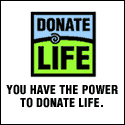I am amazed how many people are affected. I read that 1 in 3 people will be diagnosed with cancer at some point in their life! I hope that Calem and his generation will not have to worry about cancer as much as we do. ~ Laurianne Koning
This blog is dedicated to the memory of Laurianne, who died from non-smokers lung cancer in October 2005. Her hope was that a cure would be found so that others would not suffer from this disease.
Read Laurianne's StoryUm...I found this balloon...
I want that cool graphic!
Share Your Story
Email Us!
laurianneshope@gmail.com

Laurianne's Hope
Promote Your Page Too
Laurianne's Hope by Email
 In Memory of Laurianne
In Memory of Laurianne
(pictured with her son, Calem)
April 7, 1980 - October 22, 2005

See below (or click here) for books about cancer. All proceeds will be donated to cancer research.
About Us
This blog is written by Laurianne's father, hankon, and Laurianne's sister, Lynda. We hope to educate people about this disease by sharing our feelings about our loss and information about lung cancer.
Stories of Strength - My Couragous Daughter
Stories of Strength - My Sister, Laurianne
What Do You Mean, She Never Smoked?
 Supporters of Laurianne's Hope
Supporters of Laurianne's Hope
MedicineWorld.Org Lung Cancer Blog
Mom's Cancer BlogMy War Against Lung Cancer - Dr. Phil Berman's Blog
National Lung Cancer Partnership
Survivors for Lung Cancer Awareness and Support
Other Cancer Related Links
American Lung Assoication (for help with smoking cessation
The Leukemia & Lymphoma Society
Lance Armstrong Foundation (LAF) - LiveStrong
MedicineWorld.Org Lung Cancer Blog
National Brain Tumor Foundation
National Colorectal Cancer Research Alliance
Prostate Cancer Research Institute
Susan B. Komen Breast Cancer Foundation
Testicular Cancer Resource Center
Smoking Cessation Links
Other Interesting Links
What Cancer Cannot Do
It cannot cripple Love
It cannot shatter Hope
It cannot corrode Faith
It cannot destroy Peace
It cannot kill Friendship
It cannot suppress Memories
It cannot silence Courage
It cannot invade the Soul
It cannot steal eternal Life
It cannot conquer the Spirit
Anonymous
 Lives Lost to Lung Cancer
Lives Lost to Lung Cancer
d. January 5, 2007
Melissa Zagon - age 39
d. January 2, 2007
Bill Cumming - Age 67
d. September 26, 2006
Lynne White - Age 55
d. August 29, 2006
Nancy Michener - Age 51
d. June 16, 2006
Christine Plank-Meeusen - Age 26
d. May 24, 2006
Mike Diani - Age 26
d. April 3, 2006
Lo Man-fei - Age 51
d. March 24, 2006
Gerry Ehman - Age 73
d. March 21, 2006
Sandra Lee Wirth - Age 60
d. March 11, 2006
Dana Reeve - Age 44
d. March 6, 2006
Don Knotts - Age 81
d. February 24, 2006
Bruce Hart - Age 68
d. February 21, 2006
Laurianne Koning - Age 25
d. October 22, 2005
Barbara Fies - Age 66
d. October 1, 2005
Peter Jennings - Age 67
d. August 7, 2005
Sharon Gehon
d. February 13, 1997
All sales proceeds will be donated to cancer research.
Recent Entries
Support Increased Funding for Lung Cancer Research
Archives
December 2005
January 2006
February 2006
March 2006
April 2006
May 2006
June 2006
July 2006
August 2006
September 2006
October 2006
November 2006
December 2006
January 2007
February 2007
March 2007
April 2007
May 2007
July 2007
September 2007
October 2007
November 2007
December 2007
February 2008
March 2008
April 2008
July 2008
August 2008
October 2008
November 2008
February 2009
March 2009
June 2009
October 2009
November 2010
April 2011
February 2012
Credits


